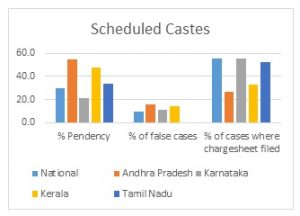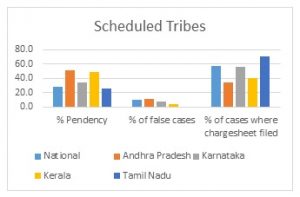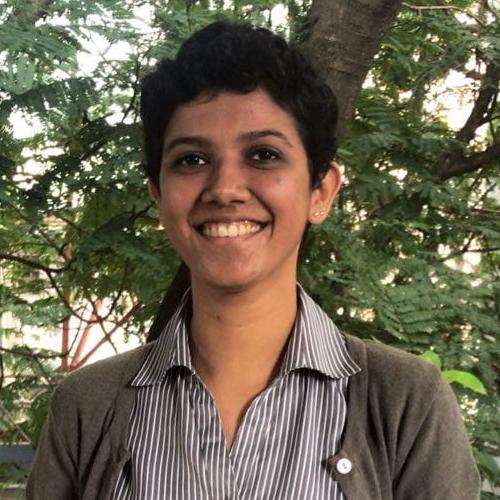In the previous post, we analysed preliminary data on crimes against SCs and STs in India, and specifically in Andhra Pradesh (AP), Karnataka, Kerala and Tamil Nadu (TN). We showed that the rate of crimes against SCs and STs at the national level is significant. We also highlighted that NCRB data from 2014 to 2016 on registration of crimes is not comparable due to changes in the methodology adopted.
Having noted that the number of reported crimes against SCs and STs is high, the next stage of the criminal justice process that demands study is the response of the investigating agencies. While a few independent reports have surveyed the response of the police to crimes against SCs and STs, NCRB reports remain the only comprehensive source of such data at the national and state level.
In this post, we undertake a cross-state comparison of the performance of the police. As the NCRB reports have not presented disaggregated data in this regard for each individual State, in 2014 and 2015, we have only surveyed data from 2016 for this post.
The Investigation
Under the Act, once a case is reported at a police station and an FIR is registered, the police is bound to investigate the case. At the end of the investigation, they must either charge the accused or dispose of the complaint.
Scheduled Castes
Out of the 55,299 crimes SCs pending investigation at the start of 2016, the police investigated 39,629 cases (65.5%) and 16,654 cases (30.11%) were pending investigation at the year end. The police filed charge sheets only in 31,042 cases (56.1%).

AP and Kerala have performed poorly against this national average, with charge sheets being filed in only 26.9% and 32.9% of cases respectively. Pendency rates in AP (54.6%) and Kerala (47.4%) were also dismal. On the other hand, Karnataka and TN reported figures in line with the national average, on both counts.
In 2016, 16.1% and 14.4% reported crimes were closed for being ‘false’ in AP and Kerala respectively, which is higher than the national average of 10%. Significantly, in Tamil Nadu, not a single case was closed on the ground of being a ‘false’.
Scheduled Tribes
The data in respect of crimes against STs are similar as well. At the beginning of 2016, 9096 cases were pending investigation in India. The police completed investigation in 6,490 cases (71.3%) while 2,602 cases (28.6%) were pending investigation at the end of 2016. Of the cases disposed of, the police filed charge sheets in 5,277 (58.01%) cases.

TN once again reported comparatively positive figures, with a pendency rate of 25.9% and charge sheets being filed in over 70% of the cases disposed of in 2016. In keeping with the trend of a poor record of crimes against STs, AP and Kerala recorded pendency of 50% or more and of the total cases disposed of, charge sheets were filed only in 34% and 41.1% respectively.
While 10% of the total cases pending investigation in 2016 were closed for being ‘false’, 11.6% of cases were disposed of on this ground in AP. Karnataka (7.5%) and Kerala (4.6%) reported figures lower than the national average while once again, no cases were closed as ‘false’ in TN.
Despite the poor numbers nationally and in the four States, the NCRB reports do not provide details on the duration of investigation and the reasons for delay. In this context, we will look at data on the next stage of criminal justice process i.e. courts and their performance on crimes against SCs and STs, in the following post.
– This post was authored by Deekshitha Ganesan, Research Associate

